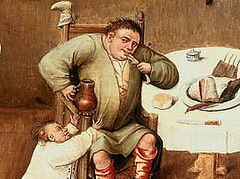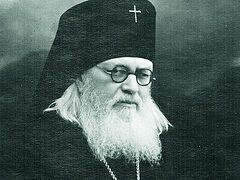The sin of idle talk is more or less present in each one of us. In fact, idle talk does not benefit either us or others. In the context of spiritual life idle talk is considered a sin that distracts you from prayer and reflection on your soul. Some will argue that it is monks who exercise stillness, but how can an ordinary layperson live in the world without communication? It is noteworthy that today, in the era of information technology, the sin of idle talk manifests itself especially often and many do not even notice it. The danger of this sin is not only in the fact that it hinders spiritual practice, but also in the fact that it can affect your everyday life and the relations with your loved ones.
 Thomas Webster. Village Gossips, 1865
Thomas Webster. Village Gossips, 1865
Any sin is connected with several passions at once. So, idle talk, as its name suggests, is primarily associated with laziness and idleness—that is, an empty pastime without physical or spiritual benefit. Of course, the Lord does not command us to labor nonstop: rest, physical and mental, is necessary for everyone. There is nothing wrong with flipping through a news feed or funny pictures, watching a feature film or a video of your favorite bloggers, or playing some game. Such pastimes becomes sinful idleness when they occur too often, when it is to the detriment of prayer, work, studies or communication with your loved ones.
Idle talk can also be related to pride and vanity, our desire to demonstrate our knowledge and skills; or maybe out of spite, malicious joy, or judging when we spread (or invent) gossip and rumors about other people. Everyone understands that these conversations will benefit neither us, nor our listeners, nor the ones we talk about. These are unnecessary, useless words that we pronounce without due consideration of their meaning and need.
Monks living in monasteries renounce the vanity of this world, try to keep silence and use words only for prayer, reading spiritual instructions during meals (in order to listen to edifying words while eating, and not to pronounce useless ones) or in order to communicate information clearly and in few words: what needs to be done, at what time a service will be, and so on. Almost all the existing literature on the practice of stillness was written by and for monks. Especially many works of the Optina Elders are devoted to this subject.
Many people will ask: “How can idle words harm someone? They are just words.” The answer should be considered from two perspectives: the spiritual and the physical.
From a spiritual perspective, idle talk distracts us from prayer and contemplation. We have already gathered with our loved ones to pray, stood up, but suddenly someone starts talking about an extraneous theme, be it the weather, animals, the quality of candles, or even some thoughts based on the text of the prayer. We don’t how fifteen minutes have flown by, and prayer has not begun. And although we are standing and ready to pray, there is no more concentration on the important things. It’s harder to pray after that, because some thoughts are still spinning in our heads after the conversation. Of course, after such prayer there will be a feeling that we have not really prayed.
It’s even worse when people talk in church, especially when they judge others. Thus, the time designed for prayer is not only wasted, but is spent in sin. It would seem, they stood for prayer or came to church, but in fact they sinned even more.
Idle talk during the sacrament of confession is harmful too. As a priest I cannot reveal the contents of people’s confessions, so I will give you an abstract example, but based on real life. An old woman judged her neighbor. And during confession she begins to tell a priest in detail how she had woken up, had breakfast, what she wore, and which store she had gone to before meeting her neighbor who said such-and-such words to her or did something wrong to her.
Or she tells a priest the story of her youth, how she worked at a clothing factory and a handsome guy from a workshop chased after her; who he dated and courted besides her. And in the end the whole story boils down to the fact that he stole something and she hid it in her house. At confession you are supposed to accuse yourself of sin, not to tell your priest stories. It would have been enough just to say that she had condemned her neighbor and in her youth she had hid some stolen things. Only these actions are sins. And this whole long story takes up a lot of time. And the priest (who is a human being, weak and also susceptible to sin) gets annoyed and the people waiting for their turn get indignant, annoyed, and start judging. This is how idle talk during confession leads others into sin.
And in our personal lives, each one of us has suffered from this sin in one way or another. For instance, from gossip and rumors. When someone spreads unpleasant things about you, whether they are false or not, you will start to feel uncomfortable. People whisper behind your back, giggle and look back in your direction. It’s unpleasant.
From my experience I can tell you how some people left church when a church worker whom the rector had reproached several times, took revenge by inventing rumors about the rector’s personal life, his wife and their moral qualities. The parishioners continued to spread these rumors further, and the church attendance decreased almost by one third. The rector could not understand what was going on until these rumors reached him. Needless to say, that after that the church worker was expelled with shame from the church, and it took the rector a long time to restore his good name and reputation. Alas, not all of the parishioners returned. Of course, there is not only idle talk here, but also malignant gossip, revenge, and pride. However, it is a very illustrative example: both the scandalmonger and his victim suffered.
And I think everyone has experienced such situations when a hasty expression of one’s opinion or criticism caused misunderstanding or even resentment, which undermined good relations with loved ones. Such a person begins to justly blame himself for not keeping quiet in a moment when he should have done so. Truly, it is not very pleasant to communicate with those who are always trying to express their opinions, even when they are not asked to. Everyone tries to avoid such people, and they themselves suffer because of it.
Sometimes it is difficult to see any sin in yourself, but in order to combat it you need to identify the “symptoms” in yourself, because without awareness of the illness it will be impossible to cure it. First, you should watch your language. If you often talk without purpose, or rather, just to talk so it does not bring any benefit either to you or to the other person, you should think seriously about it.
Second, you need to be vigilant if your words replace your actions. When someone plans to do something and talks about it, there is a false sense of achievement. And it makes him procrastinate—that is, do nothing. As a result, the words have been said, but there are no deeds or results so far.
And, of course, rumors, gossip and criticism, which I have already mentioned, are often nothing but a mixture of idle talk, judging and pride—and they do the most harm.
Where does the sin of idle talk begin? From the fact that someone is dissatisfied with himself, when he feels some of his shortcomings or feels shame because of a failure, or fear, and begins to feel a certain emptiness inside himself. Mental silence leads to introspection and self-condemnation, which cause him moral discomfort. And in order to fill this void he strives to talk as much as possible so that there would not be this painful inner silence. In addition, idle talk allows him, at least in the eyes of others, to create the illusion of success and self-confidence.
The Holy Fathers give us some advice on how to overcome the sin of idle talk. In particular, you should try not to speak first—of course, unless circumstances require it, when you have to ask about or request something, or warn somebody. If you are asked, then try to give a short and concise answer, without unnecessary details and self-aggrandizement over your interlocutor. You should try not to express your opinion so as not to offend anyone, because opinions always differ. Don’t say everything you think; try to listen more. Note that people who are able to listen, and not just waiting for their turn to speak, are much more appreciated.
If possible, in any situation you should try to do more than talk. Let your actions speak for you. And artificiality in words should be avoided: sincerity in communication reduces the likelihood of idle talk, and your language becomes more purposeful and meaningful.
Monastic literature also describes asceticism of words, when monks limit the number of words they say per day and spend a certain amount of time in silence and introspection every day. Yes, it is difficult for laypeople to do it, but you can always try.
And the most important thing in the fight against any sin is to keep in mind, With men this is impossible; but with God all things are possible (Matt. 19:26). Without turning to God, without regular prayer, confession and Communion we will always be powerless before our sins.







